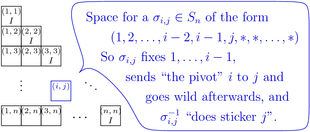10-1100/Homework Assignment 3: Difference between revisions
No edit summary |
|||
| Line 6: | Line 6: | ||
===Solve the following questions=== |
===Solve the following questions=== |
||
'''Problem 1.''' (Selick) Show that any group of order 56 has a normal Sylow-<math>p</math> subgroup, for some prime <math>p</math> dividing 56. |
|||
<center>'''Barring the unforeseen, will be posted by midnight, November 2, 2010.'''</center> |
|||
'''Problem 2.''' (Qualifying exam, May 1997) Let <math>S_5</math> act on <math>({\mathbb Z/5})^5</math> by permuting the factors, and let <math>G</math> be the semi-direct product of <math>S_5</math> and <math>({\mathbb Z/5})^5</math>. |
|||
# What is the order of <math>G</math>? |
|||
# How many Sylow-5 subgroups does <math>G</math> have? Write down one of them. |
|||
'''Problem 3.''' (Selick) Show that the group <math>Q</math> of unit quaternions (<math>\{\pm 1, \pm i, \pm j, \pm k\}</math>, subject to <math>i^2=j^2=k^2=-1\in Z(Q)</math> and <math>ij=k</math>) is not a semi-direct product of two of its proper subgroups. |
|||
'''Problem 4.''' (Qualifying exam, September 2008) Let <math>G</math> be a group and <math>p</math> be a prime. Show that if <math>H</math> is a <math>p</math>-subgroup of <math>G</math>, then <math>(N_G(H):H)</math> is congruent to <math>(G:H)</math> mod <math>p</math>. You may wish to study the action of <math>H</math> on <math>G/H</math> by multiplication on the left. |
|||
'''Problem 5.''' (easy) |
|||
# Prove that in any ring, <math>(-1)^2=1</math>. |
|||
# Prove that even in a ring without a unit, <math>(-a)^2=a^2</math>. |
|||
(Feel free to do the second part first and then to substitute <math>a=1</math>). |
|||
'''Problem 6.''' |
|||
# (Qualifying exam, April 2009) Prove that a finite integral domain is a field. |
|||
# (Qualifying exam, September 2008) Prove that in a finite commutative ring, every prime ideal is maximal. |
|||
'''Problem 7.''' (Dummit and Foote) A ring <math>R</math> is called a ''Boolean ring'' if <math>a^2=a</math> for all <math>a\in R</math>. |
|||
# Prove that every Boolean ring is commutative. |
|||
# Prove that the only Boolean ring that is also an integral domain is <math>{\mathbb Z}/2</math>. |
|||
Revision as of 18:46, 2 November 2010
| |||||||||||||||||||||||||||||||||||||||||||||||||||||||||
The information below is preliminary and cannot be trusted! (v)
This assignment is due at class time on Tuesday, November 16, 2010.
Solve the following questions
Problem 1. (Selick) Show that any group of order 56 has a normal Sylow-[math]\displaystyle{ p }[/math] subgroup, for some prime [math]\displaystyle{ p }[/math] dividing 56.
Problem 2. (Qualifying exam, May 1997) Let [math]\displaystyle{ S_5 }[/math] act on [math]\displaystyle{ ({\mathbb Z/5})^5 }[/math] by permuting the factors, and let [math]\displaystyle{ G }[/math] be the semi-direct product of [math]\displaystyle{ S_5 }[/math] and [math]\displaystyle{ ({\mathbb Z/5})^5 }[/math].
- What is the order of [math]\displaystyle{ G }[/math]?
- How many Sylow-5 subgroups does [math]\displaystyle{ G }[/math] have? Write down one of them.
Problem 3. (Selick) Show that the group [math]\displaystyle{ Q }[/math] of unit quaternions ([math]\displaystyle{ \{\pm 1, \pm i, \pm j, \pm k\} }[/math], subject to [math]\displaystyle{ i^2=j^2=k^2=-1\in Z(Q) }[/math] and [math]\displaystyle{ ij=k }[/math]) is not a semi-direct product of two of its proper subgroups.
Problem 4. (Qualifying exam, September 2008) Let [math]\displaystyle{ G }[/math] be a group and [math]\displaystyle{ p }[/math] be a prime. Show that if [math]\displaystyle{ H }[/math] is a [math]\displaystyle{ p }[/math]-subgroup of [math]\displaystyle{ G }[/math], then [math]\displaystyle{ (N_G(H):H) }[/math] is congruent to [math]\displaystyle{ (G:H) }[/math] mod [math]\displaystyle{ p }[/math]. You may wish to study the action of [math]\displaystyle{ H }[/math] on [math]\displaystyle{ G/H }[/math] by multiplication on the left.
Problem 5. (easy)
- Prove that in any ring, [math]\displaystyle{ (-1)^2=1 }[/math].
- Prove that even in a ring without a unit, [math]\displaystyle{ (-a)^2=a^2 }[/math].
(Feel free to do the second part first and then to substitute [math]\displaystyle{ a=1 }[/math]).
Problem 6.
- (Qualifying exam, April 2009) Prove that a finite integral domain is a field.
- (Qualifying exam, September 2008) Prove that in a finite commutative ring, every prime ideal is maximal.
Problem 7. (Dummit and Foote) A ring [math]\displaystyle{ R }[/math] is called a Boolean ring if [math]\displaystyle{ a^2=a }[/math] for all [math]\displaystyle{ a\in R }[/math].
- Prove that every Boolean ring is commutative.
- Prove that the only Boolean ring that is also an integral domain is [math]\displaystyle{ {\mathbb Z}/2 }[/math].

